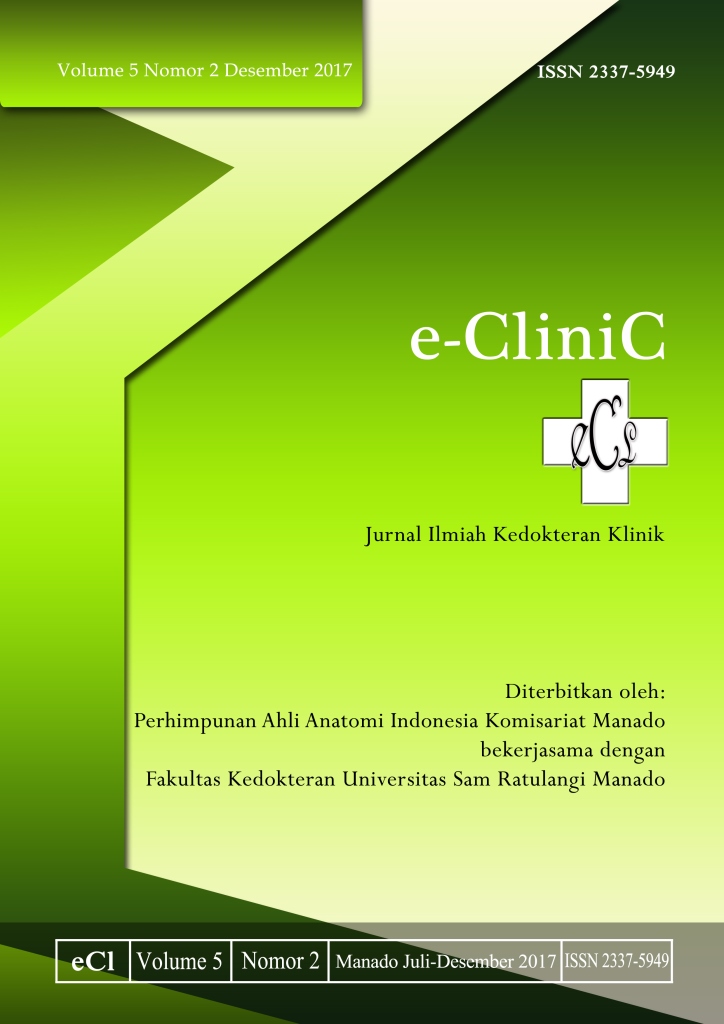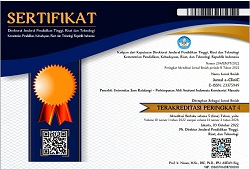Hubungan Status Gizi dan Gangguan Tidur pada Anak Sekolah Dasar di Kecamatan Tikala Manado
DOI:
https://doi.org/10.35790/ecl.v5i2.18569Abstract
Abstract: Undernutrition problem is still widespread in developing countries, including Indonesia. On the other hand, overnutrition which is the nutritional problem in developed country, is beginning to flourish in the developing countries. The nutrinitonal imbalances might be caused by inappropriate amount of sleep due to inhibition of appetite regulation and changes in hormone production. Some of the nutrients that affect sleep pattern are macronutrients and micronutrients such as vitamin B, calcium, magnesium, and iron. This study was aimed to find out the correlation between nutritional status and sleep disorder. This was an observational analytical survey study with a cross sectional design. This study was conducted at elementary schools at Tikala, Manado using purposive sampling method. Weight and height of the respondents were measured to obtain the nutritional status. Parents were asked to fill the SDSC questionnaire to obtain the sleep disorder status. Of 249 (100%) respondents, 1 respondent (0.4%) categorized as malnutrition; 44 respondents (17,7%) categorized as undernutrition; 129 respondents (52.8%) categorized as normal; 34 respondents (13.7%) categorized as overweight; and 41 respondents (16.5%) categorized as obese. There were 156 respondents (62.7%) had sleep disorder meanwhile 93 respondents (37.3%) had no sleep disorder. The Pearson correlation test showed no significant correlation between nutritional status and sleep disorder (P>0,05). Conclusion: There was no signicant correlation between nutritional status and sleep disorder.
Keywords: sleep disturbance, SDSC questionnaire, nutritional status
Â
Abstrak: Masalah gizi kurang masih tersebar luas di negara-negara berkembang, termasuk di Indonesia namun masalah gizi lebih yang merupakan masalah gizi di negara maju mulai terlihat juga di negara-negara berkembang. Ketidakseimbangan gizi dapat disebabkan tidak sesuainya jumlah tidur dikarenakan dihambatnya regulasi nafsu makan dan perubahan produksi hormon. Beberapa nutrisi yang dikaitkan memengaruhi tidur ialah makronutrien dan mikronutrien seperti vitamin B, kalsium, magnesium, dan zat besi. Penelitian ini bertujuan untuk melihat hubungan antara status gizi dan gangguan tidur. Jenis penelitian survei analitik observasional dengan desain potong lintang yang dilakukan di Sekolah Dasar di Kecamatan Tikala Manado menggunakan purposive sampling. Dilakukan pengukuran berat badan dan tinggi badan untuk mengetahui status gizi dan pengisian kuesioner SDSC oleh orang tua untuk mengetahui status gangguan tidur. Dari 249 (100%) responden, 1 anak (0,4%) masuk dalam kategori gizi buruk, 44 anak (17,7%) masuk kategori gizi kurang, 129 anak (51,8%) masuk dalam kategori gizi normal, 34 anak (13,7%) masuk kategori overweight, dan 41 anak (16,5%) masuk kategori obesitas. Sebanyak 156 anak (62,7%) mengalami gangguan tidur sedangkan 93 anak (37,3%) tanpa gangguan tidur. Uji korelasi Pearson tidak mendapatkan hubungan bermakna antara status gizi dan gangguan tidur (P >0,05). Simpulan: Tidak terdapat hubungan bermakna antara status gizi dan gangguan tidur.
Kata kunci: status gizi, gangguan tidur, kuesioner SDCS
Downloads
How to Cite
Issue
Section
License
COPYRIGHT
Authors who publish with this journal agree to the following terms:
Authors hold their copyright and grant this journal the privilege of first publication, with the work simultaneously licensed under a Creative Commons Attribution License that permits others to impart the work with an acknowledgment of the work's origin and initial publication by this journal.
Authors can enter into separate or additional contractual arrangements for the non-exclusive distribution of the journal's published version of the work (for example, post it to an institutional repository or publish it in a book), with an acknowledgment of its underlying publication in this journal.
Authors are permitted and encouraged to post their work online (for example, in institutional repositories or on their website) as it can lead to productive exchanges, as well as earlier and greater citation of the published work (See The Effect of Open Access).







